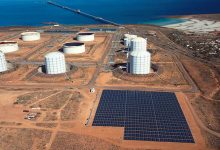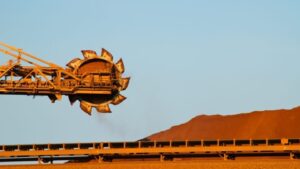The NSW government’s assessment of Santos’ planned Narrabri Gas project has been slammed as being ‘riddled with errors’, with the project currently being reviewed by the NSW Independent Planning Commission.
Santos is seeking to develop substantial reserves of coal seam gas near Narrabri, in the northwest of New South Wales, which it claims could meet up to half of New South Wales’ gas demand through the drilling of up to 850 gas wells.
In a submission to the Independent Planning Commission, the Australia Instituted has argued that the NSW Department of Planning, Industry, and Environment has significantly underestimated the long term increase in greenhouse gas emissions that the Narrabri project will be responsible for while overestimating the project’s benefits to domestic gas prices and the local economy.
“The Department’s Assessment of the NGP uncritically repeats many of Santos’s misleading claims about the need for the project and its economic benefits. Its presentation of the greenhouse gas emissions, which are equivalent to almost a full year of NSW’s emissions, as “small” and “consistent with NSW’s and Australia’s commitments to a low carbon future” shows a lack of understanding of the seriousness of climate change,” The Australia Institute’s submission says.
When the NSW planning department referred the Narrabri Gas Project to the Independent Planning Commission, it included a recommendation that the project be approved. However, research and environmental bodies are now arguing that the NSW planning department’s initial study was flawed and relied too heavily on the information provided to it by Santos.
“For the Department of Planning, Industry, and Environment to present emissions equivalent to almost an entire year of NSW emissions as “small” demonstrates a lack of understanding of the seriousness of global warming and its potential impacts on NSW. This is extraordinary in the wake of the Black Summer bushfire crisis,” principle advisor for the Australia Institute Mark Ogg said.
“The Department has seemingly drunk the Santos Kool-Aid and their assessment is full of obvious mistakes. Rather than applying serious scrutiny to Santos’ submissions, they have simply accepted the company’s highly questionable claims.”
It was an assessment echoed by leading Australian climate scientist, and member of the Climate Council, Will Steffen, who argued that a gas project like the one proposed for Narrabri would still be an unacceptable source of greenhouse gas emissions.
“Santos has been attempting to downplay the impact of its Narrabri Gas Project on Australia’s emissions. Gas is a fossil fuel, like coal and oil. Burning gas emits large amounts of carbon dioxide, and depending on how the gas is mined and processed, it can also emit significant amounts of methane, a much more potent greenhouse gas than carbon dioxide,” professor Steffen said.
The Australasian Centre for Corporate Responsibility (ACCR), which lodged a submission in opposition to the Narrabri gas project said that Santos had not demonstrated how fugitive emissions from the project would be managed, nor the overall increase in Australia’s greenhouse gas emissions.
“Santos has failed to demonstrate that it is willing or able to effectively manage fugitive methane emissions, which are more potent than carbon dioxide. Over a 20 year period, the global warming potential of methane is 85 times greater than carbon dioxide,” ACCR director for climate and environment Dan Gocher said.
The ACCR, which represents shareholder interests and has campaigned strongly to pressure companies to embrace a strategy of low carbon development, suggested that the Narrabri project could become a stranded asset for Santos.
“In 2019, Carbon Tracker found 40-50% of Santos’ capital expenditure to 2030 was outside a carbon budget consistent with a pathway well below 2 degrees – including the Narrabri gas project. This suggests that high cost reserves like Narrabri are likely to be stranded before they’re exhausted,” Gocher added.
“Just last month, Santos wrote down another $1.1 billion in value from its Australian oil and gas assets. This project is throwing good money after bad.”
The criticism was joined by federal independent MP Zali Steggall, who highlighted concerns that the costs of producing gas at the Narrabri project would be so high that the project would not contribute to any meaningful reduction to local gas prices.
“There is nothing positive about this gas project. I have seen no indication that the gas prices will be lower for the local community. I have engaged with thinktanks, environmental groups and constituents on the project and the feedback has been overwhelmingly negative,” Steggall said.
“Narrabri is a stranded asset in the making. When the world is awash in cheap gas and producers are paying people to store it, it is strange that Santos proposes a project that would push gas prices higher.”
In an address to the NSW Independent Planning Commission, Santos CEO Kevin Gallagher said that the coal seam gas project would be a “clever, low-impact way of producing clean energy”.
“This clever technology means the natural gas is able to be extracted without taking the coal out of the ground,” Gallagher said.
“Natural gas is the perfect partner for renewables and will play a key role as the world transitions to a lower-carbon future. This is because gas provides the reliability that renewables need to offset intermittency in power generation.”
Last month, Santos became the latest Australian gas producer forced to write down the value of its gas production portfolio by up to $1.1 billion, after a collapse in global gas prices. Total write offs in the Australian gas sector have approached $20 billion since the Covid-19 pandemic slashed global energy exports.
The Independent Planning Commission has heard submissions from hundreds of local residents and experts, on top of hundreds of written submissions made in response to the Narrabri Gas project proposal. The Commission’s assessment of the project is ongoing.









